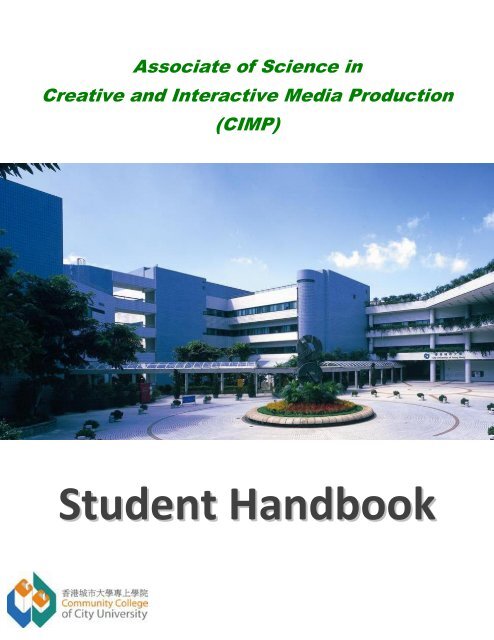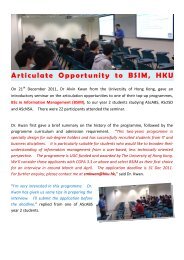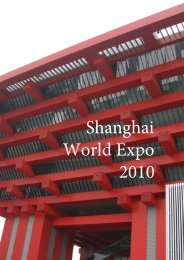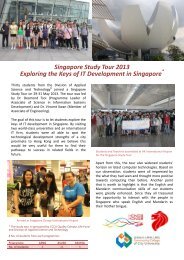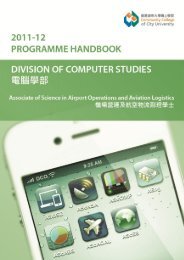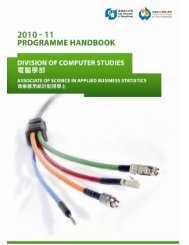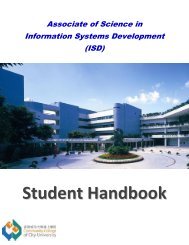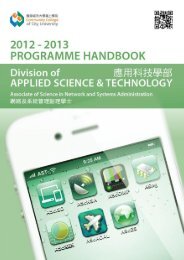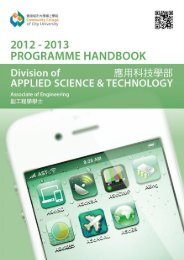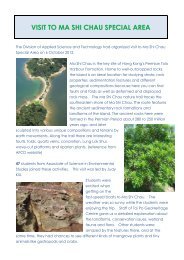S t u d e n t H a n d b o o k k - City University of Hong Kong
S t u d e n t H a n d b o o k k - City University of Hong Kong
S t u d e n t H a n d b o o k k - City University of Hong Kong
Create successful ePaper yourself
Turn your PDF publications into a flip-book with our unique Google optimized e-Paper software.
Associate <strong>of</strong> Science in<br />
Creative and Interactive Media Production<br />
(CIMP)<br />
S t u d e n t H a n d b o o k
Contents<br />
1. Introduction . . . . . . . . . . . . . . . . . . . . . . . . . . . . . . . . . . . . . . . . . . . 1<br />
2. Programme Entrance Requirements . . . . . . . . . . . . . . . . . . . . . . . . 3<br />
3. Programme General Information . . . . . . . . . . . .. . . . . . . . . . . . . . . . 4<br />
4. Programme Structure and Curriculum . . . . . . . . . . . . . . . . . . . . . . . 6<br />
5. Keyword Syllabus <strong>of</strong> Courses . . . . . . . . . . . . . . . . . . . . . . . . . . . . . 10<br />
6. Teaching, Learning and Assessment . . . . . . . . . . . . . . . . . . . . . . 15<br />
7. Student Charter . . . . . . . . . . . . . . . . . . . . . . . . . . . . . . . . . . . . . . . 16<br />
8. Further Studies . . . . . . . . . . . . . . . . . . . . . . . . . . . . . . . . . . . . . . . 21<br />
9. Division <strong>of</strong> Computer Studies. . . . . . . . . . . . . . . . . . . . . . . . . . . . . . 23<br />
10. Academic Honesty and Research Ethics . . . . . . . . . . . . . . . . . . . 27<br />
Academic Calendar 28
1 Introduction<br />
This handbook provides you with important information you need for your<br />
specific programme. You should read it carefully and keep the handbook for<br />
reference throughout your time at CCCU.<br />
The Associate Degree programme you have chosen is one <strong>of</strong> the many high<br />
quality programmes being <strong>of</strong>fered by the Community College <strong>of</strong> <strong>City</strong> <strong>University</strong>,<br />
<strong>City</strong> <strong>University</strong> <strong>of</strong> <strong>Hong</strong> <strong>Kong</strong>.<br />
There are five academic units in the College, namely the Divisions <strong>of</strong><br />
Commerce, Computer Studies, Language Studies and Social Studies, and the<br />
Centre for Lifelong Learning. Together they <strong>of</strong>fer a wide and expanding range<br />
<strong>of</strong> Associate Degree programmes and a PreAssociate Degree programme,<br />
and other shorter programmes for the benefit <strong>of</strong> the <strong>Hong</strong> <strong>Kong</strong> SAR and the<br />
wider region.<br />
The following Associate Degree programmes will be <strong>of</strong>fered in the 2007/08<br />
academic year:<br />
Offering Unit Programme<br />
Division <strong>of</strong> Commerce Associate <strong>of</strong> Business Administration<br />
(Accountancy)<br />
(China Business Management)<br />
(Electronic Commerce and Web Technology) *<br />
(Financial Services)<br />
(General Management)<br />
(Global Business)<br />
(Global Logistics and Trade Finance)<br />
(Human Resources Management)<br />
(Marketing)<br />
(with Communication Studies in English/Chinese)#<br />
AScCIMP Programme Handbook 1
Division <strong>of</strong> Computer<br />
Studies<br />
Division <strong>of</strong> Language<br />
Studies<br />
Associate <strong>of</strong> Business Administration<br />
(Electronic Commerce and Web Technology) *<br />
Associate <strong>of</strong> Engineering<br />
Associate <strong>of</strong> Science in<br />
Applied Business Statistics<br />
Airport Operations and Aviation Logistics<br />
Creative and Interactive Media Production<br />
Digital Media and Entertainment<br />
Information Systems Development<br />
Information Technology<br />
Network and Systems Administration<br />
Associate <strong>of</strong> Arts in<br />
Applied Chinese Studies<br />
Applied Japanese Studies<br />
Bilingual Communication Studies<br />
Digital Visual Design<br />
English for Pr<strong>of</strong>essional Communication<br />
Media and Publication Design<br />
Public Relations and Communication<br />
Translation and Interpretation<br />
Division <strong>of</strong> Social Studies Associate <strong>of</strong> Social Science<br />
Associate <strong>of</strong> Social Science in<br />
Applied Psychology<br />
Applied Social Studies<br />
Applied Studies in Urban Living<br />
Customer Service Management<br />
Leisure and Tourism Management<br />
Public Administration and Management<br />
Social Work ^<br />
Community College PreAssociate Degree Programme<br />
* This programme is jointly <strong>of</strong>fered by the Division <strong>of</strong> Commerce & Division <strong>of</strong> Computer Studies<br />
# This programme is jointly <strong>of</strong>fered by the Division <strong>of</strong> Commerce & Division <strong>of</strong> Language Studie.<br />
^ Offered in both government and nongovernment funded mode<br />
AScCIMP Programme Handbook 2
2 Programme Entrance Requirements<br />
To qualify for admission to the Associate <strong>of</strong> Science in Creative and Interactive Media<br />
Production (AScCIMP), you must satisfy one <strong>of</strong> the following sets <strong>of</strong> entrance<br />
requirements.<br />
2.1 <strong>Hong</strong> <strong>Kong</strong> Advanced Level Examination (HKALE) Entry<br />
Students must satisfy the following minimum entrance requirements for admission:<br />
� E in 1 HKALE subject; or E in 2 HKALE AS subjects, which may include Use <strong>of</strong><br />
English, and Chinese Language and Culture; and<br />
� E in 5 HKCEE subjects, which may include English Language (Syllabus B) and<br />
Chinese Language.<br />
2.2 Other Qualifications Entry<br />
Students who do not satisfy the HKALE entrance requirements may be considered<br />
based on other qualifications attained. These other qualifications may include an<br />
academic qualification from a local post secondary institution or a pr<strong>of</strong>essional<br />
qualification acceptable to the <strong>University</strong>.<br />
Qualifications attained by study at a local international school, or a nonlocal high<br />
school, at Grade 12 or equivalent, are also accepted as satisfying the General Entrance<br />
Requirements.<br />
Applicants whose entrance qualification is obtained in a language other than English<br />
will need an acceptable result in an approved English language qualification such as<br />
TOEFL, IELTS, or the NEAB <strong>University</strong> Entrance Test in English.<br />
2.3 Mature Applicants Entry<br />
For those who do not possess the formal academic qualifications required for admission<br />
but are aged 23 or above on 1 September in the year <strong>of</strong> admission may be granted<br />
exemption from the <strong>University</strong>’s entrance requirements, provided that they can<br />
demonstrate to the satisfaction <strong>of</strong> the <strong>University</strong> aptitude and suitability for the<br />
programme on the basis <strong>of</strong> work experience, maturity and academic attainment. Short<br />
listed mature applicants may be required to sit for an entrance examination and/or<br />
attend an interview.<br />
AScCIMP Programme Handbook 3
3 Programme General Information<br />
3.1 Aims and Objectives<br />
The programme is introduced to satisfy society’s growing manpower requirements for<br />
the digital media production industry. It also provides students with the foundation for<br />
further studies to higher degree and lifelong learning.<br />
The programme emphasises on the digital technology and development process<br />
underlying digital media production and interactive multimedia application.<br />
Upon completion <strong>of</strong> the programme, students are able to:<br />
1. explore and select appropriate media technologies and proven methodologies<br />
in the digital media production process.<br />
2. apply computing knowledge and skills in the development <strong>of</strong> interactive<br />
media system.<br />
3. demonstrate creativity in areas <strong>of</strong> media design and production.<br />
4. communicate efficiently in English as well as Chinese with clients, users, and<br />
media workers and pr<strong>of</strong>essionals.<br />
5. work effectively as members <strong>of</strong> a team in the analysis, design and<br />
development <strong>of</strong> digital media systems.<br />
6. practise in an ethical and pr<strong>of</strong>essional manner, and apply safety and healthy<br />
measures at work.<br />
7. progress to a bachelor’s degree in related discipline(s) and pursue lifelong<br />
learning for career advancement.<br />
3.2 Special Features<br />
The programme will develop students’ creative skills in digital media creation and<br />
interactive multimedia development which include digital imaging, animation, video,<br />
sound, special effects, user interface design, computing programming languages, and<br />
application logics. Students will go through experimental creative processes where<br />
theories are tested against practices and where design, various forms <strong>of</strong> digital media<br />
and computing technologies are synthesised, integrated and regenerated for original<br />
presentation.<br />
AScCIMP Programme Handbook 4
Other appropriate practical trainings such as internship scheme, media design and<br />
production tools and s<strong>of</strong>tware, and onsite technical visits or seminars will be given to<br />
broaden students’ learning. Students are also provided with a general education,<br />
especially in communication and business skills to enhance their abilities in their<br />
pr<strong>of</strong>essions and as an allaround person.<br />
The programme provides a balanced theoretical studies and practical training to prepare<br />
students for careers in the industry, at the same time, it prepares students to advance to<br />
higher academic levels, such as bachelor’s degree, or even higher level, programmes in<br />
media production, media design, and digital entertainment, either locally or overseas.<br />
3.3 Study Areas<br />
The curriculum consists <strong>of</strong> five supporting components:<br />
(1) Media and Post Production mainly focuses on how digital media is designed and<br />
produced.<br />
(2) Interactive Media and Graphics mainly focuses on graphic application and<br />
interactive system development.<br />
(3) Computer System and Programming mainly provides students with basic<br />
programming and user interface design techniques.<br />
(4) Language enables students to be effective communicators.<br />
(5) Practice and Ethics provides students with opportunities to practise their learnt<br />
skills and gives them a background <strong>of</strong> pr<strong>of</strong>essional issues about the media<br />
production field.<br />
3.4 Links with Industry<br />
The programme is pr<strong>of</strong>essionally oriented with regular input from pr<strong>of</strong>essional people<br />
<strong>of</strong> the field, such as CEOs, human resources and training managers, educators, media<br />
and advertising experts, such as Heavy Optical Limited, and Digital Magic.<br />
3.5 Career Opportunities<br />
Upon graduation, students can enter the digital mediarelated fields, including digital<br />
animation, publishing, television, film, advertising, multimedia production, business<br />
and manufacturing sectors where highend technologies (visual, sound, special effects,<br />
and interactivity) are involved in the production process.<br />
Graduate students will be qualified for a wide range <strong>of</strong> positions, such as animators,<br />
multimedia producers, interactive media application developers, sound designers,<br />
AScCIMP Programme Handbook 5
effects designers, computer game effect editor, new media designers, and production<br />
managers.<br />
4 Programme Structure and Curriculum<br />
4.1 Structure <strong>of</strong> the Programme<br />
The normal pattern <strong>of</strong> study spans over two academic years on a fulltime basis, starting<br />
in Semester A <strong>of</strong> Year 1 and finishing at the end <strong>of</strong> Semester B in Year 2. To be<br />
eligible for an Associate <strong>of</strong> Science in Creative and Interactive Media Production<br />
award, students should accumulate at least 60 credit units with the following<br />
distribution:<br />
Credit Units<br />
4.2 Core Studies<br />
Core Studies 54<br />
Language Studies 6<br />
60<br />
Course Code Course Title Credit Units<br />
CM20300 Entrepreneurship 3<br />
DCO10102 Introduction to Computer Systems 3<br />
DCO10103 Programming in Java 3<br />
DCO10104 UserCentred Design and Testing 3<br />
DCO10105 ObjectOriented Programming and Design 3<br />
DCO10701 Creative Thinking for Media Design 3<br />
DCO10702 Digital Media Design Fundamentals 3<br />
DCO10703 Introduction to Media Production 3<br />
DCO10961 Web Design and Architecture 3<br />
DCO20501 Computer Graphics 3<br />
DCO20503 3D Modeling and Computer Animation 3<br />
DCO20701 Digital Effects and Audio Production 3<br />
DCO20703 Digital Photography and Video 3<br />
DCO20702<br />
or<br />
DCO20704<br />
Internship<br />
or<br />
Media Project<br />
DCO20705 Pr<strong>of</strong>essional Issues in Media Production Industry 3<br />
DCO20962 Multimedia Authoring 3<br />
DCO20963 Interactive Media Design 3<br />
DSS10104 Practical Psychology for Management 3<br />
AScCIMP Programme Handbook 6<br />
3
4.3 Language Studies<br />
Course Code Course Title Credit Units<br />
EL1000 (EAP) English for Academic Studies 3<br />
LS12162 (EWP) Communication Skills for Designers 3<br />
* Refer to the section on ‘Language Attainment Requirement’ for details relating to the CCCU<br />
English language requirement.<br />
4.4 Language Attainment Requirement<br />
The CCCU Academic Board requires that all Associate Degree programmes include six<br />
credit units earned in fulfillment <strong>of</strong> the CCCU English requirement. This requirement<br />
must be met through study <strong>of</strong>:<br />
� a general academic English course (English for academic purposes ‘EAP’); and<br />
� a specified subjectrelated English course (English for working purposes ‘EWP’).<br />
English for Academic Purposes (EAP)<br />
The EAP course is <strong>of</strong>fered by the English Language Centre as EL1000 English for<br />
Academic Studies. Students attaining a grade/score as tabulated in either one <strong>of</strong> the<br />
following examinations are required to take EL1000 as the EAP course.<br />
Examination Taken Grade/Score<br />
AS Use <strong>of</strong> English E or below<br />
TOEFL (noncomputerized) 549 or below<br />
TOEFL (computerized) 212 or below<br />
IELTS 5.49 or below<br />
College English Test Band 5 or below<br />
Cambridge Pr<strong>of</strong>iciency in English D or below<br />
NEAB Fail<br />
If you have attained a grade/score higher than those in the table above, you are not<br />
required to take EL1000 English for Academic Studies, but you are required to take<br />
another course approved by the Division <strong>of</strong> Language to satisfy the EAP requirement.<br />
The list <strong>of</strong> approved courses is updated each year. Before enrolling in a course, it is<br />
your responsibility to check the CCCU website to ensure the course you selected is on<br />
the approved list for EAP.<br />
AScCIMP Programme Handbook 7
English for Working Purposes (EWP)<br />
All students admitted to the AScCIMP programme are required to study LS12162<br />
Communication Skills for Designers to fulfill the 3 credits <strong>of</strong> subjectrelated English<br />
requirement as EWP.<br />
4.5 Study Progression<br />
Digital media production and interactive multimedia development are substantially<br />
supported by basic computing knowledge and skills, computer fundamentals, user interface<br />
design technique, and basic programming skills are covered in the first year to help students<br />
build up the necessary IT foundation knowledge. Foundation IT courses include<br />
Introduction to Computer System, UserCentered Design and Testing, Programming in<br />
Java, and ObjectOriented Programming & Design.<br />
In view <strong>of</strong> the fact that efficient and effective communication can help students work<br />
effectively as members <strong>of</strong> a team and produce digital products and systems that match<br />
client requirements, the courses <strong>of</strong> English for Academic Studies and Communication<br />
Skills for Designer are included.<br />
In addition, students will be provided with knowledge in creative thinking and media<br />
production technique, moreover, they will be trained to be creative individual through the<br />
courses <strong>of</strong> Creative Thinking for Media Design, Digital Media Fundamental, Introduction<br />
to Media Production, and Web Design and Architecture.<br />
After acquiring necessary basic skills in year one, more advanced digital production<br />
process, graphic theories, Digital Photography and Video and interactive system<br />
development will be provided in second year through the courses <strong>of</strong> Digital Effects and<br />
Audio Production, 3D Computer Graphics, 3D Modeling and Computer Animation,<br />
Multimedia Authoring, and Interactive Media Design.<br />
To integrate what the students have learnt in courses, and to let them try out and develop<br />
their creativity, Media Project provides them with the opportunities. To pave a path for<br />
students to move on to pr<strong>of</strong>essional player level in the industry, ethical & pr<strong>of</strong>essional<br />
manner and interpersonal skill are introduced by the courses <strong>of</strong> Pr<strong>of</strong>essional Issues in Media<br />
Production Industry and Practical Psychology for Management. The course <strong>of</strong><br />
Entrepreneurship is also <strong>of</strong>fered to give students ideas about how to set up and run a small<br />
business.<br />
Presented on next page is a suggested study plan to help students complete the programme<br />
in a smooth and logical progression.<br />
AScCIMP Programme Handbook 8
\<br />
ASSOCIATE OF SCIENCE IN CREATIVE AND INTERACTIVE MEDIA PRODUCTION (2007/2008 Cohort)<br />
FullTime 2Year Programme (HKALE entrants)<br />
Total (CU)<br />
*Project/<br />
Internship<br />
Media and PostProduction Interactive Media and Graphics Practice and Ethics<br />
Language<br />
Computer System<br />
and<br />
Programming<br />
Y ear<br />
S em ester<br />
1 A DCO10102 DCO10103 DCO10701 DCO10702 EL1000 15<br />
Introduction Programming Creative Digital Media<br />
to Computer in Java Thinking Design English<br />
Systems for Fundamental for<br />
Media Design Academic<br />
Studies<br />
3 3 3 3 3<br />
B DCO10104 DCO10105 DCO10703 DCO10961 LS12162 15<br />
UserCentered ObjectOriented Introduction Web Design Communication<br />
Design and Programming to and Skills for<br />
Testing and Design Media Architecture Designers<br />
Production (EWP)<br />
3 3 3 3 3<br />
S *DCO20702 3*<br />
Internship<br />
3<br />
2 A DCO20703 DCO20701 DCO20501 DCO20962 DSS10104 *DCO20704 15<br />
Digital Digital Effect Computer Multimedia Practical Media<br />
Photography and Graphics Authoring Psychology Project<br />
and Audio for Management<br />
Video Production<br />
3 3 3 3 3<br />
B DCO20503 DCO20963 DCO20705 CM20300 15<br />
3D Modelling Interactive Pr<strong>of</strong>essional Entrepreneurship<br />
and Computer Media Issues<br />
Animation Design in<br />
Media<br />
Production<br />
Industry<br />
3 3 3 3 3<br />
Total Credit 12 15 15 9<br />
6 3 60<br />
* Note: Student can choose either DCO20702 Internship or DCO20704 Media Project (subject to availability <strong>of</strong> internship places)<br />
AScCIMP Programme Handbook 9
5 Keyword Syllabus <strong>of</strong> Courses<br />
DCO10102 Introduction to Computer Systems<br />
Basic machine architecture (processors, memory, I/O); basic operating system concepts<br />
(processes, concurrency, address spaces); I/O devices for storage and multimedia;<br />
basics <strong>of</strong> processing, storage and communication capacity; command processors and<br />
scripting; file systems; basic network architecture; installing new s<strong>of</strong>tware and devices;<br />
backups, compression, security, encryption; Internet.<br />
DCO10103 Programming in Java<br />
Computer, network, internet and Internet; Programs and Languages; Programming<br />
process; Algorithms and Pseudo code. Memory Concepts, Arithmetic, Decision<br />
Making: Equality and Relational Operators, Drawing Strings and Lines using Graphics.<br />
Control Structures, if SingleSelection Statement, if else Selection Statement, while<br />
Repetition Statement, Stepwise Refinement, Compound Assignment Operators,<br />
Increment and Decrement Operators, Primitive Types. CounterControlled Repetition,<br />
do…while Repetition Statement, switch MultipleSelection Statement, break and<br />
continue Statements, Labelled break and continue Statements, Logical Operators.<br />
Program Modules in Java, MathClass Method, Method Declarations, Argument<br />
Promotion, Java API Packages, Scope <strong>of</strong> Declarations, Methods <strong>of</strong> Class JApplet,<br />
Method Overloading. Arrays, Declaring and Creating Arrays, References and Reference<br />
Parameters, Passing Arrays to Methods, Sorting Arrays, Multidimensional Arrays. Class<br />
Scope, Controlling Access to Members, Referring to the Current Object’s Members<br />
with this, Overloaded Constructors, Set and Get Methods, Static Class Members, Final<br />
Instance Variables, Packages, Data Abstraction and Encapsulation.<br />
DCO10104 UserCentered Design and Testing<br />
Why HCI? Overview <strong>of</strong> usercentered development cycle. Human memory and<br />
perception. Introduction to usability testing. Principles <strong>of</strong> graphical user interfaces<br />
(GUIs). Choosing interaction styles and interaction techniques. HCI aspects <strong>of</strong> common<br />
widgets. HCI aspects <strong>of</strong> screen design: layout, colour, fonts, labelling. Beyond simple<br />
screen design: visualization, representation, metaphor. Multimodal interaction:<br />
graphics and sound. GUI toolkits. Prototyping. Understanding the user: user analysis,<br />
task analysis, environment analysis. Expert reviews: heuristic evaluation. Usability<br />
testing. Ethics <strong>of</strong> empirical studies. Writing evaluation and usability reports. 3D<br />
Animation. Accessibility. Globalization. Personalization.<br />
AScCIMP Programme Handbook 10
DCO10105 ObjectOriented Programming and Design<br />
Files I/O, Searching and Recursion, Exceptions handling, Introduction to object<br />
oriented analysis and design, Abstract Data Types. More on Java API: AWT and<br />
Swings, Collections. Single and Multiple Inheritance. Public Inheritance and Private<br />
Inheritance. Polymorphism, Method Overriding, Abstract Class and Interface. Class.<br />
Object and Reference. Dynamic and Static object. Introduction to OOP concepts in<br />
C++: templates, operator overloading, and inheritance. Introduction to Standard<br />
Template Library <strong>of</strong> C++: basic containers and iterators.<br />
DCO10701 Creative Thinking for Media Design<br />
Elements <strong>of</strong> creativity. Sources <strong>of</strong> creativity. Divergent thinking. Creative thinking.<br />
Critical thinking. Lateral thinking. Vertical thinking. Sensitivity to problems. Fluency.<br />
Flexibility. Originality. Elaboration. Curiosity. Imagination. Complexity. Risktaking.<br />
Brainstorming. Mind Mapping. Synectics. Analogy and Metaphor. Attribute Listing.<br />
Reversal. Checklists. 5W2H Analysis. Intellectual problem solving. Media Design.<br />
DCO10702 Digital Media Design Fundamental<br />
Explain the background and history <strong>of</strong> digital media. Basic design principles, history <strong>of</strong><br />
publishing (paper, print and desktop revolution), layout, text control, style sheets and<br />
desktop publishing. Vector and raster images, digitizing an image for editing, image<br />
scaling, image colouring, and using filters and masks. Colour theory, colour models,<br />
colour systems, psychological aspects <strong>of</strong> colour and Colour Aesthetics. Bitmap<br />
painting, brushes, texture, pattern, layering, masks and filters. Point, line, path, curve,<br />
plane, stroke, shape and fill. Concept, script, storyboard, keyframe, timeline, tweening,<br />
cycles and sprites. Viewing modes, working with 3Dprimitives, texture mapping,<br />
shading, lighting, ray tracing, rendering, morphing and 3Danimation.<br />
DCO10703 Introduction to Media Production<br />
History <strong>of</strong> audio, film and video production, stages <strong>of</strong> production, digital versus analog<br />
technology, and the production crew in media production. Production strategies,<br />
script breakdown, shooting schedule and production budget. Visual thinking,<br />
preparation for scriptwriting and scriptwriting formats. Visualization, types <strong>of</strong> shots,<br />
camera angle, composition, combining shots, sound and image interaction, and<br />
single/multiple camera directing. Types <strong>of</strong> microphone, microphone placement<br />
selection, soundsignal control and sound perspectives. Light and colour, lighting<br />
instruments, light control, light measurement and setting light instruments. Camera<br />
placement, lens control, video camera, digital camera, film camera, body, optics and<br />
recording. Analog audio, digital audio, analog video, digital video and film recording.<br />
Design elements, colour and composition. Editing modes, editing technology and<br />
AScCIMP Programme Handbook 11
techniques, and basic filmediting bench. Digital nonlinear editing, linear videotape<br />
editing, magnetic film editing and audiotape editing. Storyboards and animation<br />
preproduction, 3Dcomputer animation, digital effects, camera effects, optical effects<br />
physical effects.<br />
DCO10961 Web Design and Architecture<br />
Introduction to Internet, WWW, and wireless devices. Browser basics. Web<br />
applications and online portal evaluation. Aesthetic critiques and evaluation. Recess <strong>of</strong><br />
web design. Impacts on graphic design. Images & graphics. Graphic text. Creative<br />
background. Introduction to GUI & Web conventions. Identifying goals. User<br />
pr<strong>of</strong>iling. Elements <strong>of</strong> web design. Creative page design. Page layout. Grid control for<br />
Internet page. Artistic layout. Information Architecture Future <strong>of</strong> web design.<br />
Structuring the content. Accessibility, site navigation, taxonomy <strong>of</strong> link forms (text,<br />
buttons, icons, graphics), site maps & indexes. Publishing & publicizing. Copyrights<br />
issues for designers.<br />
DCO20501 Computer Graphics<br />
Input and output graphics devices. System hardware needs. Survey on popular<br />
graphics s<strong>of</strong>tware. Sampling. Spatial aliasing. 2D projection. 2D Transformation.<br />
Clipping. Ray tracing. 3D structures and models. Stereoscopic views. Splines.<br />
Bezier curves and surfaces. Projections. 3D Transformations. 3D viewing. Radiosity.<br />
Surface rendering. Color models and color viewing. Human perception <strong>of</strong> 3D<br />
structures. 3D geometry and trigonometry. Vector and matrix algebra. Introduction to<br />
animation sequence. Raster animations. Temporal aliasing. Motion characteristics,<br />
dynamics and kinematics. Visual perception <strong>of</strong> motion. Introduction to virtual reality.<br />
Programming with graphics Application Programming Interface, for example, DirectX,<br />
will be carried out through the course to illustrate some <strong>of</strong> the above concepts and to<br />
familiarize the students with graphics programming techniques.<br />
DCO20503 3D Modeling and Computer Animation<br />
Modeling Basics, NURBS Modeling, Polygons and Subdivision Surfaces, Artisan tool,<br />
Organic Modeling. Creative approaches in 3D Modeling. Paths and Bones, Deformers,<br />
Skinning and Character Setup, Binding, Working with Rigid Body Dynamics. Creative<br />
approaches in animation generation. Rendering Basics, Shading and Texturing,<br />
Surfaces, Lighting Design, Camera Setup and Sequence Editing, Rendering<br />
Management and Compositing.<br />
DCO20701 Digital Effect and Audio Production<br />
AScCIMP Programme Handbook 12
An overview <strong>of</strong> how directors and storytellers have driven the envelope and evolution<br />
<strong>of</strong> digital effects. An introduction to digital imaging <strong>of</strong> film and video materials.<br />
Common use <strong>of</strong> digital effects technology in almost any project. The process <strong>of</strong><br />
extracting image components from footages using digital techniques. Reverse<br />
engineering <strong>of</strong> images. simple use <strong>of</strong> computer generated imageries in digital effects,<br />
application <strong>of</strong> advanced image processing in digital effects and replacement <strong>of</strong> actors<br />
and stunt persons. Shooting practices <strong>of</strong> material for digital image compositing, various<br />
digital image compositing techniques and image compositing <strong>of</strong> CGI elements with<br />
shot elements. Audio recordings <strong>of</strong> acoustic material using a variety <strong>of</strong> advanced<br />
surround microphone and production techniques. Postproduction sound for film,<br />
animation and interactive applications.<br />
DCO20703 Digital Photography and Video<br />
Digital Darkroom. Selecting <strong>of</strong> a digital Camera. Photo Sensors. Lens types. Exposure.<br />
Lens. Resolution. Dynamic Range. Storage. File Formats and Compression Methods.<br />
Auto Adjustment. Contrast Adjustment. Levels Adjustment. Curves Adjustment.<br />
Colour Balance Adjustment. Sharpness Adjustment and Advanced Sharpening.<br />
Cloning. Colour Management. Black and White Images. Toned Monochrome Images.<br />
Types <strong>of</strong> Printers. Selection <strong>of</strong> Printer. Printing Principles. Interpolation. Preparing<br />
Images for Electronic Transfer. Image Resizing. Basic Visual Qualities <strong>of</strong><br />
Photography. Thinking Creatively. Exposure. Shutter Speed. Lens Aperture.<br />
Coverage. Light Metering. Accessories. Portrait Photography. Landscape<br />
Photography. Action Photography. Nature Photography. Creative ways <strong>of</strong> photo<br />
image taking and processing. Video formats. Digital Video Technical Features.<br />
Camcorder Filters. Audio Mixers. Video taking and editing.<br />
DCO20705 Pr<strong>of</strong>essional Issues in Media Production Industry<br />
Digital Media, Production pipeline, developing media technology, Industry and<br />
legislation, Type and structure, pr<strong>of</strong>essional roles and contracts <strong>of</strong> engagement,<br />
regulation within the media industries, Freedom <strong>of</strong> Expression, Privacy and Protection,<br />
Intellectual Property Right, Ethical issues, Ethic, theories and formal codes, business,<br />
culture, and employee/employee issues.<br />
DCO20962 Multimedia Authoring<br />
Linear and nonlinear media. Online and <strong>of</strong>fline multimedia applications. Creative<br />
approach in multimedia production. Bitmap and vector graphics. Graphics file formats.<br />
Graphics and text, masks, symbols, instances and libraries, keyframe animation,<br />
tweens, shape tweens, motion guides, shape hints, movie structure, actions and action<br />
script, navigation buttons, sound, publishing, digital data compression, introduction to<br />
audio/video streaming. Artistic use <strong>of</strong> linear and nonlinear editing, basic sound<br />
AScCIMP Programme Handbook 13
Basic special effects. Virtual view. Interactive product demonstration. Introduction to<br />
authoring packages.<br />
DCO20963 Interactive Media Design<br />
Introduction to Interactive Media. Components <strong>of</strong> interactive multimedia.<br />
Understanding users, knowledge and interface. Creative interactive products. Case<br />
studies <strong>of</strong> creative uses and applications. Interactive design. Human interface design.<br />
Interactive elements. Use <strong>of</strong> media elements. Dynamic layouts, dynamic text and<br />
dynamic colours. Human computer communication. Online humantohuman and<br />
humantocomputer communication. Participants’ feedback and narrative structure.<br />
Virtual contacts. Aesthetic Issues. Advanced User Experiences and Interface Design.<br />
Scripting and interactivity. Creating interaction with scripting language. Integrating<br />
interactive media with web applications.<br />
LS12162 Communication Skills for Designers<br />
Theories related to communication barriers; small group and organizational<br />
communication. Effective reading, speaking and writing skills. Media skills. Client<br />
briefing. Presentation <strong>of</strong> design concept (font, layout and format) and analysis <strong>of</strong><br />
rhetorical features (such as symbolic representation, imagery, tone and style) in print<br />
media. Editing and critiquing drafts. Case studies.<br />
DSS10104 Practical Psychology for Management<br />
Assertiveness training. Conflict management. Negotiation skills. Problem solving<br />
strategies, decisionstyles, metacognition, case studies. Interviewing questioning,<br />
advice giving. Interaction planning, real world practice, role play project. Communicate<br />
with the public. Training skills.<br />
CM203000 Entrepreneurship<br />
Entrepreneur and Entrepreneurship. Context <strong>of</strong> Entrepreneurship. Researching<br />
Feasibility <strong>of</strong> Entrepreneurial Ventures. Planning the Entrepreneurial Venture.<br />
Organizing the Entrepreneurial Venture. Launching the Entrepreneurial Venture.<br />
Managing Processes in Entrepreneurial Venture. Balanced Scorecard –concept and<br />
application in Entrepreneurial Venture. Managing People in Entrepreneurial Venture.<br />
Learning Organization Leadership. Managing Growth. Downturn and Exit <strong>of</strong><br />
Entrepreneurial Venture.<br />
AScCIMP Programme Handbook 14
6 Teaching, Learning and Assessment<br />
6.1 Teaching and Learning<br />
The ultimate goal for teaching and learning is to cultivate the capability <strong>of</strong> students as<br />
independent learners. Education discourses indicate that the deep approach student<br />
learning is most desirable as it involves students in the “transformation and restructuring<br />
<strong>of</strong> their knowledge to enable them to understand and interpret the material, and to view<br />
it from more than one perspective” (Chalmers and Fuller 1996:7).<br />
A mixture <strong>of</strong> lecture, tutorial and laboratory sessions will be used for delivery <strong>of</strong><br />
courses in the programme, in addition, guided discussions, case studies, peer group<br />
learning, critique and selfreflection activities will also be incorporated in teaching the<br />
courses as seen appropriate by the instructors.<br />
6.2 Assessment<br />
The assessment <strong>of</strong> student performance is an appraisal <strong>of</strong> the extent to which students<br />
are attaining or have attained the objectives <strong>of</strong> the programme. Such assessment<br />
basically consists <strong>of</strong> two components: coursework and examination, except for the<br />
integrated project work and language courses which only consist <strong>of</strong> coursework items.<br />
Hence, progress <strong>of</strong> students on the programme is assessed by a combination <strong>of</strong> both<br />
coursework and examination.<br />
To ensure quality <strong>of</strong> assessment, courses in the programme will undergo a rigorous<br />
procedure for ascertaining academic merit and relevance for associate degree level.<br />
The quality assurance procedure includes validation by course examiner, internal<br />
moderation by subject area leaders and external moderation by external academic<br />
advisor. All assessment procedures will also follow the standard and quality guidelines<br />
as stipulated by the academic regulations <strong>of</strong> the <strong>University</strong>.<br />
AScCIMP Programme Handbook 15
7 Student Charter<br />
7.1 Our Commitment<br />
The Division <strong>of</strong> Computer Studies (DCO) would like to see staff and students work<br />
together to improve the quality <strong>of</strong> teaching and learning by focusing on everyone’s<br />
responsibility to each other. The Charter sets out your rights and obligations as a<br />
student in the Division.<br />
Every possible avenue has been made to enable your study here a fruitful and<br />
worthwhile experience.<br />
7.2 Orienting Yourself for <strong>University</strong> Life<br />
You can expect us to give you the following:<br />
� A suitable introduction to student life at the <strong>University</strong>.<br />
� A handbook and a Web site containing the rules and standards that apply to your<br />
programme, with details about the courses you will study, the choices you need to<br />
make, and our regulations and procedures for assessment, behaviour, discipline, and<br />
appeals.<br />
� A calendar for the academic year and your timetable on the Web.<br />
� Details <strong>of</strong> tutorials and other learning support arrangements, including who your<br />
tutors are, what roles they have and how you can contact them.<br />
� Details <strong>of</strong> how to do course registration through the Web.<br />
� A clear statement about the requirements for passing your programme and what will<br />
happen if you do not pass key assessments.<br />
� A class to let you familiarize yourself with the use <strong>of</strong> computing facilities provided<br />
by the <strong>University</strong>.<br />
� Information about:<br />
o the Students’ Union; Computer Science Departmental Society;<br />
o our policies on health, safety, and the learning environment;<br />
o the Student Development Services; and<br />
o financial matters, including what kinds <strong>of</strong> support are provided by the<br />
Student Development Services in case you are in difficulty.<br />
We expect you to:<br />
� Get familiar with the information we give you.<br />
� Follow the rules and procedures.<br />
AScCIMP Programme Handbook 16
� Fill out the Confidential Student Information Sheet including contact telephone<br />
numbers and address, and return to the General Office in due course.<br />
� Actively participate in the activities organised by the Students’ Union, Departmental<br />
society and the Division.<br />
7.3 Making Teaching and Learning Effective<br />
You can expect us to provide the following:<br />
� Teaching and learning activities that are uptodate, well planned and based on<br />
market need.<br />
� A range <strong>of</strong> ways to encourage and assess learning at each level <strong>of</strong> study.<br />
� A schedule <strong>of</strong> assignments for each course with reasonable time for completion.<br />
� Details <strong>of</strong> how you will be assessed and the type <strong>of</strong> feedback you will get.<br />
� Your assignments marked and returned back to you with feedback from the tutor<br />
within a reasonable period <strong>of</strong> time, unless there is a good reason why this cannot be<br />
done.<br />
� A suitable learning environment for each type <strong>of</strong> learning activity.<br />
� The chance to express your opinion about the programme through group/class<br />
representatives or by yourself.<br />
� Regular occasions to discuss your progress and get study advice through tutors and<br />
lecturers.<br />
� As much notice as we can if we change the teaching arrangements.<br />
� A notice on the notice board or through the email if we have to cancel or reschedule<br />
class.<br />
� Replacement classes as necessary due to cancelled classes.<br />
� Information about what is expected in project work, how we will mark it, and what<br />
formal supervision there will be.<br />
� An education level which lets you achieve a similar standard to those students doing<br />
a similar programme in <strong>Hong</strong> <strong>Kong</strong>.<br />
� Continuous support for students with special needs from your Year Tutors.<br />
� Concise course materials on the Web.<br />
� A timetable posted on individual lecturer’s door to indicate the consultation hours.<br />
� � A detailed description on academic honesty in the ‘Student Guide’ Website.<br />
We expect you to:<br />
� Familiarize yourself with the programme documents and, particularly, the academic<br />
requirement for graduation.<br />
� Work enthusiastically through your chosen programme <strong>of</strong> study.<br />
� Attend the scheduled classes and explain the reasons for any time <strong>of</strong>f to your<br />
tutor/lecturer.<br />
� Hand in coursework on time and tell tutors if you have any problems.<br />
AScCIMP Programme Handbook 17
� Do the assignments and laboratory exercises on your own and do not copy from your<br />
fellow classmates.<br />
� Give us evidence <strong>of</strong> any circumstances that you think have affected your study.<br />
� Contact the tutor/lecturer during tutorial or consultation hours in case you have<br />
queries about the subject matter.<br />
� Keep us informed upon change <strong>of</strong> contact telephone numbers and/or addresses by<br />
reporting to the General Office (GO) and Academic Regulations and Records Office<br />
(ARRO) as soon as possible.<br />
� Read the Notice Board and check your email on regular basis.<br />
� Browse the Web sites concerned to obtain uptodate information on course materials<br />
on regular basis.<br />
� � Give us your opinion on the teaching and learning activities provided.<br />
7.4 Participating As a <strong>University</strong> Citizen<br />
You can expect to receive:<br />
� Information about how students are represented and involved in making decisions on<br />
<strong>University</strong> matters through Student Development Services. There are several ways to<br />
involve yourself in making decisions in the <strong>University</strong> and opportunities to give your<br />
opinions and comments and get a response.<br />
� The chance to be represented on decisionmaking boards and groups such as the<br />
College Board, etc.<br />
We expect you to:<br />
� Participate actively in the nomination and election <strong>of</strong> student representatives.<br />
� Take advantage <strong>of</strong> the training opportunity provided and attend relevant meetings if<br />
you decide to be a student representative.<br />
7.5 Making Full Use <strong>of</strong> Learning Support<br />
You can expect us to do the following:<br />
� Make sure that the library has at least one copy <strong>of</strong> each book and article that lecturers<br />
recommend in course outlines.<br />
� Make sure the College Open Access Area is open at appropriate times.<br />
� Make sure that any planned changes to learning support and computing facilities are<br />
advertised.<br />
� Provide a quiet and virusfree environment in the College Open Access Area.<br />
� Provide advice at the help desk if you have problems using computers in the<br />
computer laboratories and the College Open Access Area.<br />
AScCIMP Programme Handbook 18
We expect you to do the following:<br />
� Respect the rights <strong>of</strong> other users by keeping quiet, and refrain from eating and<br />
drinking in each Computer Laboratory and the College Open Access Area.<br />
� Follow the health and safety procedures and regulations in the laboratories.<br />
� Return items which you have borrowed when they are due for return.<br />
� Follow the rules posted in each Computer Laboratory and the College Open Access<br />
Area and the instructions <strong>of</strong> the Technical Support Centre (TSC) staff.<br />
� Take reasonable steps to protect computer equipment and not to install your own<br />
unauthorised s<strong>of</strong>tware.<br />
� Report any defects found in computer equipment to the TSC staff as soon as<br />
� possible. Refrain from occupying computer equipment if you are not using them.<br />
7.6 Looking Ahead for Career Planning<br />
You can expect us to do the following:<br />
� Provide uptodate, accurate and detailed information on what you can do after you<br />
leave the <strong>University</strong>, including further education, training and job opportunities.<br />
� Provide career education as part <strong>of</strong> your study.<br />
� Arrange for career advisers from Student Development Services to answer your<br />
questions.<br />
� Provide job vacancies on the Notice Boards.<br />
� Help you practise interviewing skills through sessions arranged by Student<br />
Development Services.<br />
We expect you to do the following:<br />
� Visit the Career Resources Centre to seek career information and guidance during the<br />
final year <strong>of</strong> your programme <strong>of</strong> study.<br />
� Attend training programmes on interviewing skills <strong>of</strong>fered by the Student<br />
Development Services.<br />
� Tell the Career Resources Centre if you cannot go to activities they have specially<br />
arranged for you.<br />
� Obtain interview guidelines at the division website<br />
7.7 Handling Complaints<br />
It is our belief that the best way to improve the Division is to improve communication<br />
between students and staff. If you do have a problem, tell the person concerned. This<br />
AScCIMP Programme Handbook 19
also a standard you can base on to assess the performance <strong>of</strong> a lecturer/tutor while<br />
out the Teaching Feedback Questionnaire (TFQ).<br />
If you think there is something wrong with the programme or the course you are<br />
studying, you should talk first to the staff member directly involved in the matter. That<br />
is, the course tutor or lecturer teaching the course. If you are not satisfied with his/her<br />
answer, you should speak to:<br />
� Course Examiner (for course specific problems)<br />
� Year tutor (for general matters)<br />
� Technical Support Centre (TSC) supervisor (relating to computing facilities)<br />
� Deputy Programme Leaders/Programme Leader, or<br />
� Head <strong>of</strong> Division<br />
You can expect us to do the following:<br />
� Provide the names, contact numbers and email addresses <strong>of</strong> your Year Tutors,<br />
lecturers, TSC supervisor, Deputy Programme Leaders and Programme Leader on<br />
the General Notice Board.<br />
� Address the matter in an objective manner.<br />
We expect you to do the following:<br />
� Be objective and brave to speak up.<br />
� Talk to your class representatives to rectify the situation.<br />
� Communicate with us and make suggestions.<br />
AScCIMP Programme Handbook 20
8 Further Studies<br />
Articulation pathway can provide chances for prospective students to move on to higher<br />
academic levels; therefore it is one <strong>of</strong> the main concerns in the design and development<br />
<strong>of</strong> the programme.<br />
After completion <strong>of</strong> the twoyear study <strong>of</strong> the Associate <strong>of</strong> Science in Creative and<br />
Interactive Media Production, students will have the opportunity <strong>of</strong> getting credit<br />
transfer or advanced standing for admission to Bachelor Degree in local or overseas<br />
universities, subject to academic merits. The following table presents the current<br />
confirmed articulation programmes:<br />
Institutes Programme Titles<br />
Coventry <strong>University</strong>, UK<br />
(in collaboration with<br />
DCO)<br />
BA in Business Information<br />
Technology<br />
The following table presents the some potential articulation programmes at a quick<br />
glance.<br />
Institutes Programme Titles<br />
<strong>City</strong> <strong>University</strong> <strong>of</strong> BSc in Creative Media<br />
<strong>Hong</strong> <strong>Kong</strong><br />
BA in Creative Media<br />
<strong>Hong</strong> <strong>Kong</strong> Internet and Multimedia Technologies<br />
Polytechnic <strong>University</strong> BSc(Hons)<br />
<strong>Hong</strong> <strong>Kong</strong> Bachelor <strong>of</strong> Arts (Honours) in Art and<br />
Polytechnic <strong>University</strong> Design in Education<br />
<strong>Hong</strong> <strong>Kong</strong> Art School Bachelor <strong>of</strong> Arts in Fine Art (Ceramics /<br />
Painting / Photography)<br />
SPEED <strong>of</strong> <strong>Hong</strong> <strong>Kong</strong><br />
Polytechnic U/<br />
<strong>Hong</strong> <strong>Kong</strong> Art School<br />
BA in Applied and Media Arts<br />
Baptist<br />
The Bachelor <strong>of</strong> Arts (Communication<br />
<strong>University</strong>/<strong>University</strong><br />
<strong>of</strong> South Australia<br />
and Media Management)<br />
Lingnan <strong>University</strong> BA in Visual Studies<br />
Sunderland <strong>University</strong>,<br />
UK<br />
BA in Electronic Media Design<br />
AScCIMP Programme Handbook 21
Bradford <strong>University</strong>,<br />
UK<br />
London Metropolitan<br />
<strong>University</strong>, UK<br />
London South Bank<br />
<strong>University</strong><br />
BA in Computer Animation<br />
BA in Digital Media<br />
BA in Digital Media<br />
BA in Digital Media Arts<br />
The Division <strong>of</strong> Computer Studies (DCO) is currently running an onsite topup<br />
articulation degree programme, BA in Business Information Technology, in<br />
collaboration with the Coventry <strong>University</strong>(UK). This Degree programme provides an<br />
immediate articulation for the graduates <strong>of</strong> the ASc Creative and Interactive Media<br />
Production.<br />
As the CIMP programme also involves substantial courses related to IT, student can<br />
also apply for IT/Computer related programmes in various <strong>Hong</strong> <strong>Kong</strong> local<br />
universities.<br />
AScCIMP Programme Handbook 22
9 Division <strong>of</strong> Computer Studies<br />
9.1 Academic Staff<br />
Acting Head<br />
Choi Yiukuen, Charlie BSc CUHK, MSc Leeds; PhD Sund;, CEng, MIEE,<br />
MACS, MIE(Aust), MHKIE, RPE(ENS)<br />
Associate Head<br />
Cheung Fookwah, Derek BCommSc Hwa Kiu Coll <strong>of</strong> Com & Eng;, DipMS HK;<br />
MBA Brun;, MHKCS, MIDPM, ABIM, MInstM, AMITD<br />
http://personal.cityu.edu.hk/~dccheung/<br />
Personal Secretary<br />
Hui Kingfong, Shirley<br />
Principal Lecturer<br />
Chan Chikong, Joseph BSc, MSc Wisconsin; MSc, PhD Indiana; MACM,<br />
MASA, MARO, MINNS, MIEEE<br />
http://personal.cityu.edu.hk/~dcjcchan/<br />
Senior Lecturers<br />
Ip Yinghar, Cassandra BCom, MCom NSW; EdD Bristol; FCPA, MHKCS<br />
Lam Kwokkeung, Terry GradDip CNAA; MSc Birm<br />
http://personal.cityu.edu.hk/~dctkklam/<br />
Layfield, Andrew Martin BSc Sus; MSc Leic; PhD Hull<br />
Li Siwai, Ivan BSc, MS S Carolina<br />
http://personal.cityu.edu.hk/~dcivan/<br />
Wong Pakkeung, Patrick BSc Sask; DipEd CUHK; MA St Johns; PhD Hull;<br />
MHKCS, MACM, MIEEE<br />
http://personal.cityu.edu.hk/~dcpkwong/<br />
AScCIMP Programme Handbook 23
Lecturers<br />
Chan Yuwing, Terence BSc, MBA Sask; CQA<br />
http://personal.cityu.edu.hk/~dcywchan/<br />
Chang Fong Cheukwai,<br />
Rose<br />
HDip CPHK; BSc N Lond; MBA Surrey; MEd HKPU;<br />
MHKCS<br />
http://personal.cityu.edu.hk/~dcrose/<br />
Chau Chicheong BSc National Taiwan; MSc Mich. State;<br />
Certified Novell Engineer,<br />
CISCO Certified Academy Instructor<br />
http://personal.cityu.edu.hk/~dcchauch/<br />
Cheung Wingchung,<br />
Bryan<br />
MSc Essex; DBA, UniSA; CITP, MBCS, MIEEE, CCAI;<br />
iCarnegie Certified Instructor (DB systems, UserCentered<br />
Design, Computer System); IBM Management<br />
Development Program Trainer<br />
http://personal.cityu.edu.hk/~dcbryanc/<br />
Hui Faiki, Riemann BSc CUHK; MPhil <strong>City</strong> HK, MHKCS, MACS<br />
http://personal.cityu.edu.hk/~dchuirfk/<br />
Lau Honchuen, Albert BA <strong>City</strong> HK; PGDip, MSc Sheff Hallam<br />
http://personal.cityu.edu.hk/~dcccclau/<br />
Lau Kinhung, Rossella BA <strong>City</strong> HK; PGDip, MSc Sheff Hallam<br />
http://personal.cityu.edu.hk/~dcccclau/<br />
Li Wang Shinyi, Alice BA Indiana<br />
http://personal.cityu.edu.hk/~dcalice/<br />
Liang Tienyau, Samuel BSc N'cle(UK); MSc CPHK; MIEEE<br />
http://personal.cityu.edu.hk/~dcsliang/<br />
Ma Waikin, Kenny BA Sus; MBA Leic.<br />
http://personal.cityu.edu.hk/~dckenny/<br />
Ong Seowyen, Jane BS McG; MS San Diego State; DBA UniSA; MIEEE,<br />
MACM, CCAI, CCNA, CCNP, SCP CISCO Certified<br />
Networking Academy, Regional Instructor & Coordinator,<br />
IBM Management Development Program Trainer<br />
http://personal.cityu.edu.hk/~dcsyong/<br />
Siu Kamtim, Brian MSc Lond; MPhil <strong>City</strong> HK; MBCS, MACS, MAIM,<br />
AScCIMP Programme Handbook 24
MHKCS, MHERDA<br />
http://personal.cityu.edu.hk/~dcbksiu/<br />
Tse Ning, Cyril BSc Jinan; MPhil <strong>City</strong> HK; MEd HKPU; EdD UWA<br />
http://personal.cityu.edu.hk/~dccyril/<br />
Assistant Lecturer<br />
Kwong Chunghang,<br />
Timothy<br />
BBA, MPhil <strong>City</strong> HK<br />
9.2 General Office and Administration Support<br />
Executive Officer<br />
Lun Kitming, Kimmy<br />
Clerical Officers<br />
Au Yinwa, Josephine<br />
Cheung Lokyi, Twinkle<br />
Szeto Sukwah, Karen<br />
General Office<br />
Location: P6801 Academic Building<br />
Opening hours: Monday – Friday 8:30 a.m. – 5:30 p.m.<br />
Saturday 9:00 a.m. – 12:00 noon<br />
Enquiries: 27888763<br />
dco.enquiry@cityu.edu.hk<br />
9.3 Technical Support Centre<br />
Computer Officer<br />
Yiu Chiwai, Raymond<br />
Assistant Computer Officers<br />
Wong Sanchuen, Michael<br />
Chow Wantin, Francis<br />
Technicians<br />
Lo Kaikeung, Ivan<br />
Yau Yuen, Dennis<br />
AScCIMP Programme Handbook 25
Technical Support and Counter Services<br />
Location: P6903 Academic Building<br />
Opening hours: Monday – Friday 9:00 a.m. – 5:30 p.m. (day time)<br />
6:30 p.m. – 9:00 p.m. (evening)*<br />
Saturday Closed*<br />
Sunday & Public Holidays Closed<br />
Enquiries: 27889821<br />
dco.enquiry@cityu.edu.hk<br />
* Support hours would be revised according to different class schedules in different semesters.<br />
College Open Access Area<br />
Location: P6902 Academic Building<br />
Opening hours: Monday – Sunday 8:00 a.m. – 11:00 p.m.<br />
9.4 Further Information<br />
For more information about our programmes and the Division, you may visit our<br />
website or email us.<br />
Homepage: http://www.dco.cityu.edu.hk/<br />
Email: dco.enquiry@cityu.edu.hk<br />
AScCIMP Programme Handbook 26
Academic Honesty &<br />
Research Ethics<br />
Academic honesty and research ethics are your responsibility. <strong>City</strong> <strong>University</strong><br />
and CCCU advise you that: “You must pursue your studies with academic<br />
honesty, which is central to the conduct <strong>of</strong> academic work. You are expected to<br />
present your own work, give proper acknowledgement <strong>of</strong> other's work, and<br />
honestly report findings obtained.” For the source <strong>of</strong> this quotation and more<br />
information, please visit: (<br />
http://www.cityu.edu.hk/arro/studguide/conductnbehaviour/index.html).<br />
When you are conducting and reporting research, you should not only follow<br />
proper conventions for intext citations and references as referred to in the<br />
above website and as instructed by your tutors, but you must also follow<br />
important principles in research ethics, especially: 1) respect the participants<br />
(i.e., subjects), 2) do not harm the participants, and 3) ask participants’<br />
permission to do certain things, such as permission to taperecord an interview.<br />
AScCIMP Programme Handbook 27
Semester A 2007/08<br />
Academic Calendar<br />
Wk S M T W T F S Events / Public Holidays<br />
September 2007 Semester A 3 Sep 2007 to 1 Dec 2007<br />
Wk 1 2 3 4 5 6 7 8 3 Semester A starts<br />
Wk 2 9 10 11 12 13 14 15<br />
Wk 3 16 17 18 19 20 21 22<br />
Wk 4 23 24 25 26 27 28 29 26 Day following MidAutumn Festival<br />
30<br />
October 2007<br />
Wk 5 1 2 3 4 5 6<br />
Wk 6 7 8 9 10 11 12 13<br />
1<br />
1 National Day<br />
2 Graduation Date<br />
Wk 7 14 15 16 17 18 19 20 19 Chung Yeung Festival<br />
Wk 8 21 22 23 24 25 26 27<br />
Wk 9 28 29 30 31<br />
November 2007<br />
1 2 3<br />
Wk 10 4 5 6 7 8 9 10<br />
Wk 11 11 12 13 14 15 16 17<br />
Wk 12 18 19 20 21 22 23 24<br />
Wk 13 25 26 27 28 29 30<br />
December 2007<br />
1 1 Last Day <strong>of</strong> Teaching<br />
2 3 4 5 6 7 8 3 8 Student Revision Period<br />
9 10 11 12 13 14 15 10 22 Examination Period<br />
16 17 18 19 20 21 22<br />
23 24 25 26 27 28 29<br />
30 31<br />
24 Dec 2007 12 Jan 2008 Semester Break<br />
25 Christmas Day<br />
26 First weekday after Christmas Day<br />
AScCIMP Programme Handbook 28
Semester B 2007/08<br />
Wk S M T W T F S Events / Public Holidays<br />
January 2008 Semester B 14 Jan 2008 to 26 Apr 2008<br />
1 2 3 4 5<br />
6 7 8 9 10 11 12<br />
Wk 1 13 14 15 16 17 18 19 14 Semester B starts<br />
Wk 2 20 21 22 23 24 25 26<br />
Wk 3 27 28 29 30 31<br />
February 2008<br />
1 2<br />
3 4 5 6 7 8 9<br />
24 Dec 2007 12 Jan 2008 Semester Break<br />
1 First weekday in January<br />
6 12 Lunar New Year Break<br />
7 9 Lunar New Year Holidays<br />
Wk 4 10 11 12 13 14 15 16 15 Graduation Date<br />
Wk 5 17 18 19 20 21 22 23<br />
Wk 6 24 25 26 27 28 29<br />
March 2008<br />
Wk 7 2 3 4 5 6 7 8<br />
Wk 8 9 10 11 12 13 14 15<br />
Wk 9 16 17 18 19 20 21 22<br />
Wk 10 30 31<br />
23 24 25 26 27 28 29 24 Easter Monday<br />
April 2008<br />
1<br />
1 2 3 4 5 4 Ching Ming Festival<br />
Wk 11 6 7 8 9 10 11 12<br />
Wk 12 13 14 15 16 17 18 19<br />
21 Good Friday, 22 Day following Good Friday<br />
20 26 Easter Break<br />
Wk 13 20 21 22 23 24 25 26 26 Last Day <strong>of</strong> Teaching<br />
27 28 29 30 28 Apr 3 May Student Revision Period<br />
May 2008<br />
1 2 3 1 Labour Day<br />
4 5 6 7 8 9 10 5 19 Examination Period<br />
11 12 13 14 15 16 17 12 Buddha's Birthday<br />
18 19 20 21 22 23 24 20 May 7 Jun Semester Break<br />
25 26 27 28 29 30 31<br />
June 2008<br />
1 2 3 4 5 6 7<br />
AScCIMP Programme Handbook 29
Summer Term 2008<br />
Wk S M T W T F S Events / Public Holidays<br />
June 2008 Summer Term 10 Jun 2008 to 26 Jul 2008<br />
1 2 3 4 5 6 7 20 May 7 Jun Semester Break<br />
Wk 1 8 9 10 11 12 13 14<br />
Wk 2 15 16 17 18 19 20 21<br />
Wk 3 22 23 24 25 26 27 28<br />
Wk 4 29 30<br />
July 2008<br />
9 Day following Tuen Ng Festival<br />
10 Summer Term starts<br />
1 2 3 4 5 1 HK SAR Establishment Day<br />
Wk 5 6 7 8 9 10 11 12<br />
Wk 6 13 14 15 16 17 18 19 15 Graduation Date<br />
Wk 7 20 21 22 23 24 25 26 26 Last Day <strong>of</strong> Teaching<br />
27 28 29 30 31 28 Jul 2 Aug Student Revision Period<br />
August 2008<br />
1 2<br />
3 4 5 6 7 8 9 4 9 Examination Period<br />
10 11 12 13 14 15 16 11 30 Term Break<br />
17 18 19 20 21 22 23<br />
24 25 26 27 28 29 30<br />
31<br />
AScCIMP Programme Handbook 30


